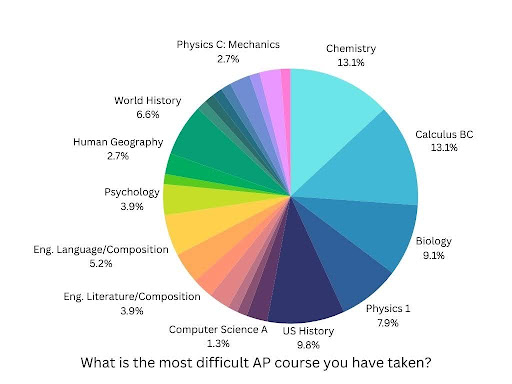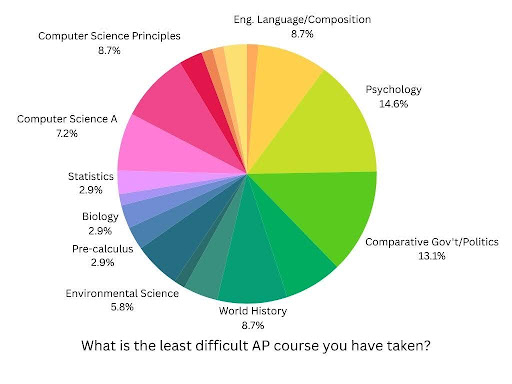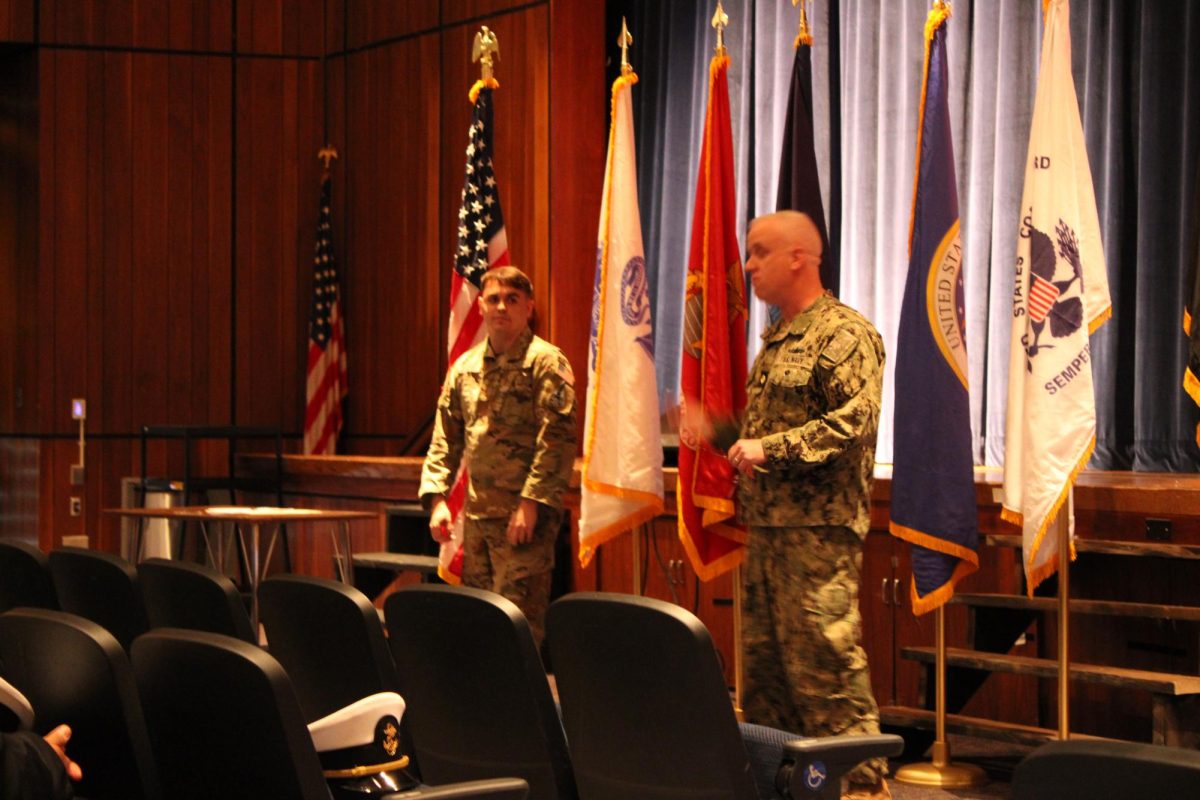Overview:
In 1952, Kenyon College conducted a study across four prep schools and three other colleges which found it beneficial to allow high school seniors to challenge themselves with college level curriculum and take exams for the chance to earn college credit. A pilot program of the Advanced Placement (AP) courses was run later that year and then officially administered nationwide in ten subjects in 1955: Mathematics, Physics, Chemistry, Biology, English, History, French, German, Spanish, and Latin. The AP program today is run by College Board and offers 38 courses (*=offered at MTHS) in a wide variety of subjects ranging from economics and global politics to calculus and chemistry. Exams for these courses are taken in May, and are scored on a 1-5 scale, 5 being the best possible score, 1 being the lowest. Students can typically cover college credits with a 3+, but it varies from college to college. There is debate over which AP course/exam is the most difficult. Pinpointing which course in specific is the hardest is nearly impossible, as it is highly dependent on each student’s skills and preferences, but this list will attempt to rank course/exam difficulty on multiple factors such as student polling, score distributions and workload. Exam pass rate alone, while it may seem like a straightforward method of ranking these courses, is not entirely indicative of course difficulty. For example, courses such as Calculus BC and Chinese Language/Culture have two of the highest exam pass rates, which is not due in any part to the exam being easy, rather, most students who take this course both have a strong base of prior knowledge (in the case of Chinese Language/Culture, many students are native speakers) and have a good understanding of what they are getting into and the work ethic/study skills it will take to succeed.
Notes:
- All language courses will be grouped together and ranked as one on the list as they are difficult to differentiate in difficulty
- Art courses will not be included in ranking due to how different the exam and course are from the rest of the courses listed
- Pre-Calculus will be excluded from the ranking as it began as a course this fall
- All AP classes are challenging and just because a class is near the bottom of the list does not mean it is easy
- On the contrary, do not be discouraged from challenging yourself with a difficult course just because it is at or near the top of the list
Methods:
- 2023 AP exam score distributions
- Polling- 75 current and graduate students from MTHS, other local schools, and online AP class discussion boards were asked 3 questions:
- What is the most difficult AP course you have taken?
- What is the least difficult AP course you have taken?
- Specify why
- Results are depicted in the charts below (some courses are slices of the chart but are labeled)


Ranking:
#26- Comparative Government and Politics. Pass Rate- 71%
While there is a wide range of information the College Board could throw at you on the exam, most of the content in this course is straightforward and simple. The large majority of the course is memorization, the only other skill students will likely need is some ability to interpret some simple data in order to answer some stimulus based questions on the exam or understand in class topics such as age dependency ratios and income inequality. Basic prior knowledge on economics and world politics also gives students a step up on the exam.
#25- Psychology. Pass Rate- 60%
Psychology is another course that requires students to memorize large quantities of information whether it be psychological disorders, famous psychologists, or research method terms. Understanding the anatomy of the eye, ear, nerve cell and brain can be a little challenging which puts psychology a step above Comparative Government. Most students enter Psychology with no prior knowledge on the topic, which also makes it slightly more difficult. Again students will have to be able to interpret some basic data. Many students can find the information interesting as it is more than likely different from any other class they have taken before, if you find the information intriguing, succeeding should not be difficult for you.
#24- Computer Science Principles. Pass Rate- 68%
Often a course offered to freshmen, Computer Science Principles is a good course for students to ease their way into AP coursework. Many of the concepts in the early units of Computer Science Principles are extremely straightforward and could be answered without taking the course. As the units progress, students will learn the basics of the python programming language. This course differs from the two before it as it does require more application of concepts and math, over pure memorization, but overall the concepts are not too difficult to grasp.
#23- Human Geography. Pass Rate- 54%
Another course/exam based mostly in memorization, the concepts in Human Geography are for the most part straightforward. Most students will have some prior knowledge on the basic concepts of geography, culture, government, and immigration present in the course. Students again will need to be able to interpret maps and other models. The simple course content might leave students overly confident prior to the exam though, as 34% of students scored a 1 in 2023.
#22- Environmental Science. Pass Rate- 53%
A mixture of biology, earth sciences, chemistry and algebra, Environmental Science is a more in depth look at a combination of topics most students have some prior experience with, making it not too difficult for most. Students will have to not just remember but be able to understand and apply certain scientific processes such as the nitrogen cycle, the earth’s atmosphere, El Nino and La Nina. Consequently, come exam time, students must be able to analyze these concepts through drawings. The exam is mostly multiple choice with a few FRQs, like most courses listed thus far, making it fairly simple. Additionally, most schools, including MTHS have hands-on components such as labs and field trips.
#21- Modern World History. Pass Rate- 65%
Typically known as the easiest AP history, many students find the class to be fun and interesting as it sets the framework for our modern world. In addition, most students have some basic world history background knowledge from prior high school or middle school courses. Exam wise, Modern World History is a large jump from the exams previously listed as you have to master the skills of the long essay (LEQ) and document based (DBQ) questions. Interpreting documents for both the DBQ and most multiple choice questions is an important but difficult skill to master for students. A positive to the fact that nearly every question on the exam is paired with a stimulus is that certain questions can be answered by properly interpreting the document even if you do not recall the content. All that being said, like any AP course, history especially, Modern World History requires a lot of memorization which will be time consuming for most students.
#20- Macroeconomics. Pass Rate- 64%
Macroeconomics, like the name suggests, focuses on the broader concepts of economics such as international markets and trade, inflation/unemployment, and the use of fiscal policy. Some schools require students to take Macroeconomics before Micro, making it difficult to put Macro ahead of micro in terms of difficulty. Examining data is an extremely important skill in this class, as many questions will involve a stimulus. The exam is on the simpler side with just 60 multiple choice questions and 3 FRQs.
#19- Microeconomics. Pass Rate- 66%
Microeconomics looks more at the specifics of an economy like the interactions of individual markets and businesses, the impact of individual consumer choices, and how to be financially smart through things like proper investment choices and cost benefit analysis. Microeconomics involves more math and students must remember some formulas. The skill of interpreting data remains important as it was in macro and the exam is the same format.
#18- Seminar. Pass Rate- 88%
Seminar is a prerequisite course for AP research, both of which are very different from the typical AP course. Seminar is a co-curricular course which enables students to research complex ideas and global issues. Oftentimes these subjects will cross with student’s other courses, such as history. During Seminar students will learn to evaluate information from a variety of sources, and learn to research to formulate proper arguments. These skills will help students prepare for college style writing assignments and coursework. The Seminar exam is unique, with a large part of the assessment being teacher scored. The exam is made up of a 1,200 word individual research report and 2,000 word individual argument, both of which are scored by College Board, then a team and individual multimedia presentation of roughly 8 minutes coupled with an oral defense which are both teacher scored. These tasks are worked on throughout the year and students take the typical AP exam in May which consists of 3 SAQs and one LEQ. The class material in this course is relatively simple, but students must be efficient with their time, oftentimes outside of class, to succeed.
#17- Research. Pass Rate- 84%
Students taking Research select an appropriate topic that they find intriguing and conduct year long research on it. The assessment/exam for the class is worked on year long and is a 4000-5000 word academic paper graded by College Board, coupled with a 15-20 minute oral presentation graded by their teacher, on the topic they chose at the start of the year. Like seminar, Research requires students to properly manage their time and work towards their end of year final product. Composing a 4000 word academic paper as a highschooler is no easy task, but doing so along with learning the other beneficial skills in Research will allow students to be better prepared for college writing.
#16- U.S. Government and Politics. Pass Rate- 49%
U.S. Government requires students to have a basic understanding of the foundational principles of U.S. history, the basic structure of government and how it operates and basic political science terminology. U.S. Government is a heavy duty memorization class, with students being required to remember 14 supreme court cases for the exam and multiple foundational documents, which is not easy and possibly contributes to the extremely low pass rate. Watching the news, keeping up with current events and having an overall basic grasp on how the U.S. government’s works prior to the class should set students up for success.
#15- English Language and Composition. Pass Rate- 56%
Labeled by some teachers as “an english course for math students”, AP English Language (Lang for short) is a unique, formulaic approach to an English course. Appealing to many students for this reason, there is usually no reading or analyzing literature like a typical English course (rather that is left for Lang’s counterpart AP English Literature). While likely not formally learning about the concepts of rhetorical analysis, most students have picked up on some of the concepts in this part of the course from previous English courses. Likewise, the majority of students have some background in writing argumentative and synthesis essays. Even with background knowledge, learning to properly analyze rhetorical texts can be very challenging. The biggest challenge in AP Lang lies in the time constraints on the exam. Writing 3 essays in just over 2 hours while reading and annotating multiple passages can be a great challenge.
#14- Statistics. Pass Rate- 60%
Statistics is regarded by many in a similar way that AP Lang is, that being uncharacteristic of a typical math course. The actual math concepts are not too daunting in this course and are coupled with writing and real world applications of the math done. Similarly to Computer Science Principles, some early parts of the course do not involve actual math and rather lay the groundwork for the concepts later in the course. While the separation from a typical math course may be great for some, at the same time the shift can be difficult for some students who are used to calculation oriented math courses.
#13- Computer Science A. Pass Rate- 67%
Computer Science A is an introductory course into javascript, an online coding language. The concepts the course breaks into are relatively simple and prior coding experience is not required but certainly would help. Teachers will often guide students along in this course as most are inexperienced. This could lead to the FRQ section of the exam becoming more challenging when students must independently write multiple program codes. Overall, the course is not too challenging for students as long as sufficient effort is put forth.
#12- Foreign Languages. Pass Rate (averaged out)- 73%
College Board offers 6 AP foreign language courses: French, Spanish, Latin, German, Italian and Chinese. Differentiating these courses among themselves and even among the rest of the AP courses is difficult because it is highly dependent on prior experience. Oftentimes, especially with a language like Chinese, which has an entirely new alphabet and is known for being extremely difficult to learn, students are native speakers. In other cases, schools require students to have 3 years of prior foreign language courses before they can take the AP. With proper prior experience, most of the courses should not be too difficult and just an extension of previous knowledge. Latin is an exception, as seen in the much lower pass rate (57%), as many students do not have access to Latin courses in school.
#11- Biology. Pass Rate- 64%
Biology probably requires the least amount of math among the notably hard AP science courses (Chemistry, Biology, Physics). Rather, Biology is more memorization based. That being said it requires a fair amount of applying concepts. Many of the multiple choice exam questions are stimulus based and require students to dissect diagrams, which can be a difficulty to some, but also allow other students to naturally reach an answer without knowing the material. Biology will certainly require a good amount of studying, but should not overwhelm most students.
#10- Literature and Composition. Pass Rate- 77%
This course can be very meticulous and difficult unless you have an extreme knack or passion for literature and writing. As opposed to its counterpart- AP Language and Composition- Literature and Composition requires heavy amounts of reading which leads to the course being more time consuming and having a heavier workload. Many of the works frequently read in the course come from old American literature which students often find boring to read and analyze. For one of the FRQs on the exam, students must write an analytical essay on a concept in a work selected by the student. Recalling information from a work read previously in the year can be difficult, especially under the stressful circumstances of the exam.
#9- European History. Pass Rate- 59%
European History covers a broad history of Europe from 1450-present. Similar to all AP History courses, European History has a heavy content load and requires students to be able to properly analyze primary sources. European History is slightly more generalized compared to AP U.S. History due to the wider time frame and geographical range of the content covered in the course. Having no background AP History courses or knowledge in European/World History, can make this course very difficult as students will have to take in a lot of new information while developing historical thinking skills.
#8- Calculus AB. Pass Rate- 58%
Calculus AB introduces some difficult new concepts such as integration, derivatives and differentiation. To succeed in Calculus AB, students must be fairly proficient in algebra, trigonometry and other pre-calculus concepts. Calculus AB covers less content then BC, so it moves at a slower pace, which gives students more time to grasp the new concepts.
#7- U.S. History. Pass Rate- 48%
What makes U.S. History so difficult for most students is how detailed the content of the course is, as previously stated in the European History description. Students must remember the names of many reformers, politicians, political parties, bills (failed, passed, repealed), terms and their impacts on the development of American History. Even with a great teacher who thoroughly covers the content, it is easy to pass over a specific person and their work who might appear on the exam. Students likely have a fair amount of background knowledge on the early units of the course, which can ease the overwhelming amount of content, but overall it is still very difficult to remember and apply the vast amounts of information.
#6- Physics 1: Algebra Based. Pass Rate- 45%
Being the course with the lowest pass rate in 2023, it is no question Physics 1 is a very difficult course. Physics 1 is often the first advanced Physics course students take and there are a lot of overwhelming concepts students find difficult to wrap their heads around, such as rotational motion and torque. Although some basic algebra and trigonometry skills are necessary to succeed, the main challenge of the course is conceptual understanding and application.
#5- Physics 2: Algebra Based. Pass Rate- 68%
Physics 2 expands upon some Physics 1 concepts such as kinetics, so students who take Physics 1 prior to this course will be much better prepared. Physics 2 also introduces lots of new content, notably thermodynamics, electromagnetism, and fluid systems. All the math in this course is still limited to algebra and trigonometry, making it lighter in comparison to the Physics C courses. Overall Physics 2 is similar to Physics 1 in terms of difficulty, but most students find the concepts slightly more difficult and Physics 1 is partially needed to understand course material.
#4- Physics C: Mechanics. Pass Rate- 73%
Physics C: Mechanics builds off a lot of concepts in Physics 1 like kinematics and gravity. Physics C: Mechanics requires an understanding of calculus, albeit minimal and often taught within the class, this jump in math compared to Physics 1-2 can be difficult for some students. Many students know what they are getting into and enter the Physics C courses with background knowledge in another physics course or calculus which contributes to the relatively high pass rate, but all in all Physics C: Mechanics requires a combination of difficult concepts and higher level math which proves challenging for most students.
#3- Calculus BC. Pass Rate- 78%
As previously mentioned, Calculus BC covers all that AB does in addition to new topics such as parametric equations, vector functions and the taylor series. In some schools, MTHS being one, Calculus AB/BC are grouped together as one course. When they are taught as two separate courses, Calculus BC just covers more content at a faster pace and gets into some more difficult concepts. Being that Calculus AB is challenging on its own, a course that covers more challenging content in a shorter span of time would certainly make it one of the most challenging AP courses.
#2: Physics C: E and M. Pass Rate- 68%
Physics C: E and M- like Physics 1 to Physics C: Mechanics- expands upon many of the topics in Physics 2 such as electromagnetism and thermodynamics. Additionally, Physics C: E and M concepts build off some content in Physics C: Mechanics. The calculus element remains in this course and the concepts become more challenging. Due to the difficulty of the course, the exam has a fairly nice score curve, which can allow students to achieve the college credits even with the rigor of the course.
#1- Chemistry. Pass Rate- 75%
Chemistry is a blend of all the factors that make an AP course difficult. Heavy load of information, sufficient background knowledge, math skills, and conceptual analysis. Equilibrium, kinects and atomic structure all prove to be difficult concepts for many students. Unlike Physics C courses, Chemistry does not require an understanding of calculus, but does require students to be proficient in algebra and trigonometry. Many questions require students to understand complicated charts or diagrams as well. Overall, Chemistry requires students to excel in all levels of intellect.
AP Resources:






























